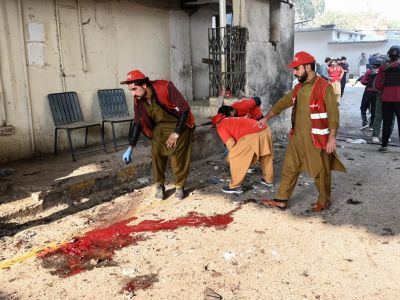At least two million people voted in the southern Philippines on Tuesday in a referendum on extending Muslim self-rule over nearly a fourth of the largely Roman Catholic nation in a bid to end a 30-year separatist rebellion, officials said.
Election officials said there was no reported violence in the 27,000 precincts in the Mindanao and Palawan regions but early, unofficial results indicated the majority had voted against expanding the Muslim autonomous area.
A hoax bomb threat in the city of General Santos late Monday and a fake report of an attack by Muslim rebels in the island of Jolo were the only irritants in the voting, election officials said.
Security had been tight as polling opened at 7:00 am (2300 GMT Monday) in some of the most violence-prone areas of the country, which has been mired for 30 years in Muslim separatist rebellions.
Up to half the 4.9 million qualified voters in the region were estimated to cast their ballot, the Commission on Elections (Comelec) said.
They blamed the low turnout on torrential rain and flooding, a boycott by some Muslim groups and objections to the vote by officials in Christian-dominated areas of the south of the Southeast Asian archipelago.
Many Christians, who make up the majority in the south and are seen to be wealthier than the Muslims, also stayed away from the referendum that covered 14 provinces and 14 cities, fearing the imposition of Islamic rule, officials and analysts said.
The private watchdog body, the National Movement for Free Elections (Namfrel) said many voters felt the plebiscite was "a futile exercise."
Some voters said they saw no improvement in conditions in the existing autonomous area since it was created.
Voters were asked whether their province or city should join the four-province Autonomous Region for Muslim Mindanao (ARMM), set up in 1989. The official result should be known in a week's time, Comelec chairman Alfredo Benipayo said.
Aides said President Gloria Arroyo only expects two southern cities to hook up with the ARMM.
"We cannot expect the turnout in a plebiscite to be as good as in a regular election because here there are no candidates vying for public office," Benipayo said.
"You cannot say that because of that (low turnout) the plebiscite is not valid."
"I felt too lazy to go out to vote," said Nasruddin Samad, 27, a male Muslim government employee from Maguindanao province, blaming the Comelec for not conducting a massive information drive on issues to be resolved in the plebiscite.
The military and police beefed up security around the region following reports the Moro National Liberation Front (MNLF), led by ARMM governor Nur Misuari, would seek to disrupt the plebiscite.
Ex-rebel leader Misuari has slammed the plebiscite as an "exercise in futility" and called for a boycott.
Misuari heads the Tausug tribe and has been accused by other Muslim groups of favouring only his community in making political appointments in the autonomous region.
Officials said an enlarged ARMM territory would be the carrot Manila needs to convince Islamic separatists to sign a peace deal and end three decades of rebellion.
The Moro Islamic Liberation Front (MILF), a splinter group of the MNLF, signed a ceasefire accord with the government last week ahead of negotiations to settle the rebellion.
But most of the residents of the south are wary of joining ARMM, a political entity populated by 2.2 million people who live in the poorest region in the Philippines.
Christians are worried they might face the same hardship of the Muslims. Many stayed away to register their dissent with some precincts reporting that not a single voter turned up.
"The Christian residents are saying: do not use us to placate the Muslims," said Filipino political scientist Amado Mendoza -- COTABATO, Philippines (AFP)
© 2001 Al Bawaba (www.albawaba.com)









